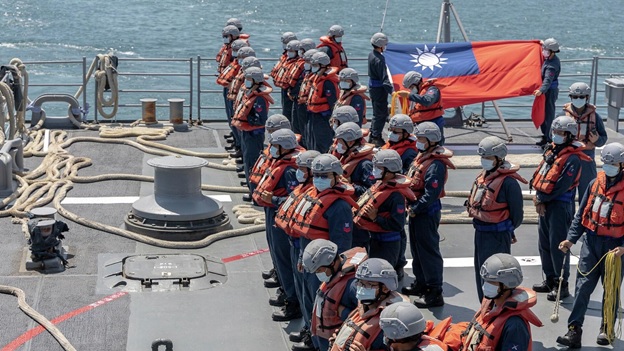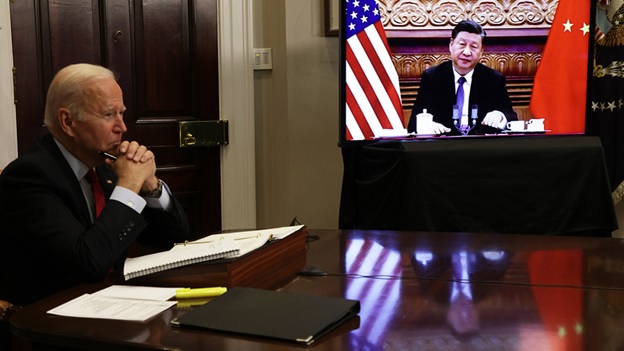Against the background of negotiations between the leaders of the PRC and the United States, geopolitical tension in Northeast Asia is only growing.
The Chinese Foreign Ministry said that the Chinese President and the US President had a "sincere and thorough conversation." The heads of state exchanged views on the Ukrainian conflict. The President of the PRC "expressed his principled position" on this problem. We agreed to maintain contacts between the working government groups of the two countries.
"We strongly oppose separatism - the" independence of Taiwan, "as well as the interference of external forces (in the affairs of China) and will never leave room for the forces of Taiwan's independence in any form. The position of the Chinese government and the Chinese people on the "Taiwan issue" has been consistent, and more than 1.4 billion Chinese are determined to resolutely defend China's national sovereignty and territorial integrity. You can't go against public opinion. Playing with fire, you will set yourself on fire, "CCTV quoted the Chinese leader as saying.
What is happening between China and the United States, as well as in Northeast Asia as a whole in the era of geopolitical change - in the material of the international columnist The Moscow Post.
Region of problems
Relations between China and the United States are important for stability in the world, primarily in the Northeast Asia region (IAA). The Pacific coast and the entire Far Eastern region of the Russian Federation, bordering Japan, the Korean Peninsula and China, is part of the IAA. Like Europe, the region has been through conflicts and wars over the past 130 years that have left tensions and territorial disputes, mistrust and enmity, and American military bases in Japan and South Korea.
At a meeting on June 29 in Madrid, NATO adopted the Strategic Concept, in which China is called the main threat to the world order. The alliance has pledged to counter Beijing's growing influence by working closely with the US and its allies in Asia, including Japan, Australia, South Korea and New Zealand.
The annual White Paper on Japan's defense expressed alarm over its "encirclement" by China, Russia and North Korea. U.S. Defense Secretary Lloyd Austin said, "The U.S. commitment to protecting Japan and South Korea remains unbreakable, and that of course includes our expanded deterrence commitments, bolstered by the full range of U.S. conventional and nuclear capabilities."
He reiterated that the US "nuclear umbrella," ensuring that Washington would retaliate in the event of a nuclear attack on Japan or South Korea, is firmly entrenched. Further, called the US-Australia-UK Trilateral Defence Pact (AUKUS) a "guiding light" that could "help reduce barriers to defence cooperation with other allies and partners in the future." The allies are Japan and South Korea.
Tensions and conflicts in relations were accompanied by an arms race. As a consequence, Japan's Maritime Self-Defense Force is considered one of the most advanced fleets. The South Korean army is armed by American standards. The DPRK has tested a nuclear device and de facto has nuclear charges and their delivery means, that is, nuclear deterrent forces.
The increase in tension on the Korean Peninsula is primarily caused by the DPRK's nuclear missile program, and not by joint exercises between the United States and the Republic of Korea. This was stated by South Korean Foreign Minister Park Chin at a press conference for foreign journalists held on Wednesday in Seoul.
Korean Fragile World
DPRK leader Kim Jong-un, in his speech on the anniversary of the end of the Korean War (1950-1953), said that the DPRK "is fully ready for any military clashes with the United States," threatened to destroy the South Korean army. "The United States mistakenly calls all our daily actions provocations and threats and at the same time conducts large-scale joint exercises that seriously threaten our national security. This is literally gangster behavior that pushes relations between the DPRK and the United States to conflict, and to irreversible, "he said.
Japan itself, under the American nuclear "umbrella," considers Pyongyang's nuclear missile potential unacceptable, is considering the option of developing means to strike at missile bases of "possible opponents." This was stated by the Deputy Secretary General of the Japanese Government Yoshihiko Isozaki.
This is a "necklace" of historical problems strung on the tragedy of the divided peoples of Korea and China, Washington uses both in the interests of a military-political presence near the borders of China and Russia, and in domestic political intrigues in the United States.
The DPRK, meanwhile, recognized the independence of the Donetsk and Lugansk People's Republics. The Ukrainian Foreign Ministry said that Kyiv is severing diplomatic relations with Pyongyang. The ambassadors of the DPRK and the DPR in Russia met in Moscow. Shin Hong Chol handed Olga Makeeva a note on Pyongyang's recognition of the independence of the DPR. The DPRK, as stated by the Permanent Representative to the UN Kim Song, is ready "to fully support the position of the Russian Federation regarding Donetsk and Lugansk."
Nancy Pelosi gathers for war
Among the problems left by the war is Taiwan's. This island haunts the American political elite. Speaker of the US House of Representatives Nancy Pelosi, already at an advanced age, was going to visit Taiwan on a visit.
Having begun her career with a tough attitude towards communist China, she seems to have decided to raise her rating with this visit before the congressional elections. She declined to answer questions about the contents of the trip to Taipei, citing "security concerns."
Indeed, the safety of the inhabitants of this autonomous Chinese province, as well as relations between the PRC and the United States, may turn out to be a price that will have to be paid for the political ambitions of a middle-aged lady. For the United States, this visit is fraught with new tensions with China, where Taiwan is considered part of the country and does not hide dissatisfaction with the contacts of US representatives with the island administration.
The White House believes that the speaker of the House of Representatives has the right to decide whether to go to her, "said John Kirby, strategic communications coordinator at the National Security Council. The Financial Times, which reported on Pelosi's trip, spoke of a delegation of lawmakers to Taiwan, Japan, Singapore, Indonesia and Malaysia. The group is also expected to visit US Indo-Pacific Command.

Taiwan remains the main point of tension. On a photo: staff of Naval Forces of Taiwan during the annual exercises of "Han Kuang". Photo: AP Photo/Taiwan Presidential Office/Shioro Lee
"The powerful diplomatic culmination" of career of Pelosi can turn back the conflict. The USA isn't ready to such turn of events yet. Earlier it was supposed that the risk of collision in the Taiwan Strait will reach peak approximately in 2027. The former commander of the Indo-Pacific fleet of the USA admiral Filip Davidson spoke about this "schedule", speaking at hearings in the Congress in March, 2021.
Career, "values", self-advertisement
The trip of Pelosi can shift the American "schedule of collision" for five years to the left. The former U.S. Secretary of State, the republican Mike Pompeo supported the democrat colleague Pelosi, having written on Twitter: "Nancey, I will go with you. I am forbidden in China, but not on freedom-loving Taiwan. We will meet there!"
At a daily briefing for the press the representative of the Ministry of Foreign Affairs of China Wang Wenbin said that the Congress is a part of the U.S. Government, and the visit of Pelosi to Taiwan "will seriously break" policy of Uniform China. "If the American side insists on a visit, China will resolutely work to accept counter-measures", - he told.
The official representative of the Ministry of Defence of the People's Republic of China Tan Kefei said that the army of China won't be idle in case of a visit of Pelosi to Taiwan, will take drastic measures for suppression of external intervention.
Hu Xijin, the former editor-in-chief Chinese the pro-government edition Global Times, wrote on twitter: "It is undoubted that reaction of the continent to a visit of Pelosi will be unprecedented and will cause the shocking military answer".
And Pelosi who is preparing for intermediate elections, answered, how in the pre-election commercial: "I think that the president said that, perhaps, military were afraid that our plane will be shot down by Chinese".
US military men against a trip
If US military men are also concerned by something, then it the public nature of the forthcoming visit. Colby's Elbridge, the former Deputy Assistant Secretary of defense of the USA stated that the situation becomes more and more dangerous and that Washington should show care. "China approaches carrying out attack on the island. In this situation we need to focus on fast and sharp increase in our defensive power. Symbolism at this stage isn't necessary", - Colby told.
Symbolism is also that Taiwan reminds "Russophobic Kiev" in translation into language of the facts. Whereas Japan is East Asian "anti-Chinese Warsaw". The USA supplies the island with weapon, Japan sets on all. The former Minister of Defence of Taiwan Li Xing Min said that armed forces of the island need reforms in the face of what he called the "existential threat" proceeding from China.
Li told that Taipei needs the strategy of cooperation with the USA that Taiwan could focus on defense of near perimeter, and the USA - on distant approaches. He also offered that Taiwan created the constant forces of area defense consisting of volunteers, as in Ukraine.
In June the United States Secretary of Defense Lloyd Austin said that Washington is ready to expand the help to Taiwan in the field of arms and military preparation in response to the growing threat of China. Japan, in turn, takes the place of one of the leading trade and economic partners of Taipei. Both Washington, and Tokyo understand a strategic importance of the island as chief world supplier of modern chips.
"The Chinese military will watch closely that from where the military aircraft of the USA with Pelosi onboard will take off", - Koichi Isobe, the retired three-star commander of East army of ground forces of self-defense of Japan told. He, as well as other Japanese analysts believe that in the Taiwan Strait forces of the USA in Korea and Japan can be involved in the American-Chinese collision too.
Ryan Hass from Institute of Brookings, suggested to reconsider trip terms. Otherwise the visit of Pelosi to Taiwan can become a public call to Beijing. The senior military analyst of RAND Derek Grossman noted that the visit of Pelosi to Taiwan "puts all parties in a difficult situation". China should react or lose face.
Joe Biden and Xi Jinping talked
The U.S. continues to maintain "strategic uncertainty" about Taiwan's "defense," White House national security adviser Jake Sullivan said Friday. "Our policy has not changed. And we maintain a policy of strategic ambiguity, "he said at the Aspen Security Forum in Colorado.
Earlier in May, Joe Biden caused upheaval with his comments when asked if the United States was ready to intervene if China threatened Taiwan. Speaking at a joint press conference with Japanese Prime Minister Fumio Kishida, the US president said: "Yes. It's a commitment we've made. "
Those remarks raised questions about whether Washington was moving toward "strategic clarity." According to experts, the policy of strategic uncertainty is aimed not only at keeping China from using force against Taiwan, but also at dissuading Taiwan from seeking a formal declaration of independence.

Photo: Alex Wong/ Gettyimages.ru
US President Joe Biden assured Chinese President Xi Jinping that Washington does not support separatism in Taiwan, the Chinese Foreign Ministry said following talks between the leaders of the two countries. "I want to repeat once again, the US position on the" one China "policy has not changed and will not change, the American side does not support separatism in Taiwan," Biden said.
Believe it or not!




.jpg?v1659331582)
.jpg?v1659331582)
